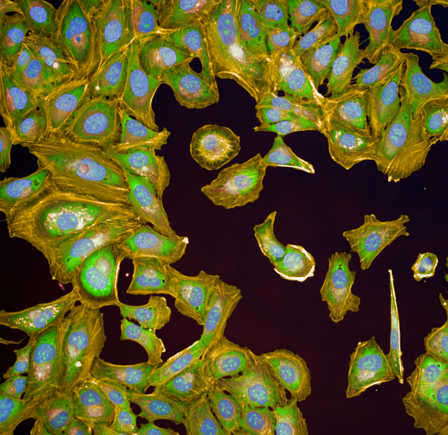EPA’s Dr. Johanna Nyffeler Awarded 2020 Young Researcher Lush Prize for Efforts to Limit Animal Testing
Published December 15, 2020

EPA Postdoctoral grantee Dr. Johanna Nyffeler, a computational toxicologist, is a Lush Prize 2020 Young Researcher winner. The Lush Prize recognizes efforts to end or replace the use of animal testing and is the largest prize fund in the non-animal testing sector. Prize categories include science, training, public awareness, lobbying, black box, and young researcher. Dr. Nyffeler was awarded the Young Researcher Prize for her research efforts using new approach methods (NAMs) to rapidly test the biological activity of environmental chemicals in human-derived cells and extending those methods towards in vitro assessment of developmental neurotoxicity.
Dr. Nyffeler, along with her team under Dr. Joshua Harrill’s direction, will apply a high-throughput phenotypic profiling (HTPP) method known as Cell Painting to cells representative of those found in the human nervous system.
The “Cell Painting” method allows scientists to visualize cell changes upon chemical exposure. Different parts of the cell, like the nucleus and the mitochondria, are uniquely labeled using fluorescent dyes. The labeled cells are then rapidly imaged on an automated microscope. The images are then analyzed to quickly characterize the response of the cells and identify the lowest concentration of test chemicals where changes in the cell occur.

This novel animal-free in vitro (e.g. in a test tube, culture dish, etc.) screening method is cost-effective and allows Dr. Nyffeler to test many chemical responses at once.
Additionally, these methods allow scientists to get a more comprehensive understanding of cellular responses to chemical exposure. Traditional in vitro toxicity tests are typically targeted analyses, meaning that the researchers are looking for changes to a specific molecular target. HTPP is a non-targeted analysis that allows scientists to examine a larger variety of responses within the cell. This is especially beneficial when prioritizing chemicals for regulation or further risk evaluation.
Dr. Nyffeler studied in Switzerland before pursuing her Ph.D. at the University of Konstanz, Germany in Biology. Dr. Nyffeler plans to continue efforts to create an in vitro test system that is completely free of animal-derived materials. She has also been using HTPP data to compare chemicals with different or unknown characteristics, to allow for rapid prioritization of chemicals and that may eventually help in the development of adverse outcome pathways (AOPs).
